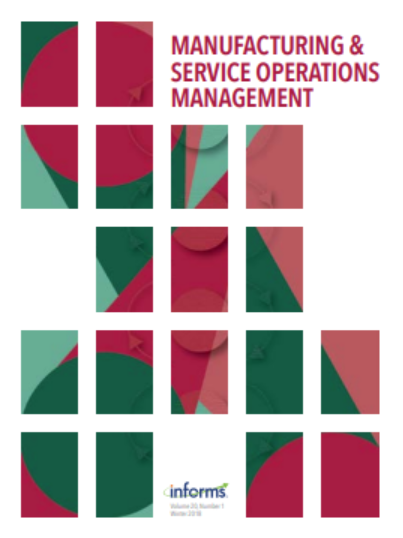战略制造商下的快速反应
IF 4.8
3区 管理学
Q1 MANAGEMENT
M&som-Manufacturing & Service Operations Management
Pub Date : 2023-10-17
DOI:10.1287/msom.2021.0561
引用次数: 0
摘要
问题定义:快速响应是一种经典的运营策略,它允许零售商在销售季节使用从早期销售中获得的信息下达快速补充订单。在制造商的批发价格是外生给定的情况下,快速响应的效益在文献中得到了广泛的研究。本文以新兴中小企业时装品牌的实践为背景,重新探讨了当制造商可以策略性地设定其批发价格时,零售商快速反应的价值。方法/结果:我们建立了一个由一个制造商和一个零售商组成的博弈论模型。与传统的快速响应设置不同,制造商可以动态调整常规订单和补货订单的批发价格。首先,我们调查快速响应是否以及何时仍然有利于零售商。我们发现,在需求不确定性较低或显著较高的情况下,企业拥有共同的优先订购策略,快速响应对零售商和供应链都有利。但在中等需求不确定性条件下,零售商偏好的订货策略与制造商的利益存在冲突;因此,制造商会设定批发价格来对抗零售商的订购策略,这使得快速反应对零售商不利。其次,我们寻找能够解决这一冲突的机制,并恢复快速反应的有益效果。我们表明,让制造商预先承诺批发价格对解决问题是无效的。然而,如果零售商能够在常规批发价格确定后,对补货订单(可能包括补货数量)提出一个接受或放弃的批发价格,那么快速响应将为两家公司带来双赢的结果。管理启示:研究结果提醒实力较弱的零售商(如中小企业)在采用快速反应时,特别是在面临中等高需求不确定性时。零售商虽然弱小,但应该意识到零售商提出补货条件的天然能力,否则,零售商总是可以放弃快速反应;这为设计更有利的安排提供了机会。资金:j .陈的工作得到了国家自然科学基金(拨款72171202,72171202);胡强的工作得到国家自然科学基金资助[基金资助:72271057,72091211];石博士的工作得到国家自然科学基金[no . 72102205]和深圳市高等学校稳定支持计划的支持;张峰的工作得到了国家自然科学基金资助[no . 71929201,72131004]。补充材料:在线补充材料可在https://doi.org/10.1287/msom.2021.0561上获得。本文章由计算机程序翻译,如有差异,请以英文原文为准。
Quick Response Under Strategic Manufacturer
Problem definition: Quick response is a classic operations strategy that allows a retailer to place a rapid replenishment order during the selling season using information learned from early sales. The benefits of quick response are widely studied in the literature under the condition that the manufacturer’s wholesale prices are exogenously given. Motivated by the practice of emerging small and medium-sized enterprise (SME) fashion brands, this paper revisits the value of quick response for a retailer when a manufacturer can strategically set its wholesale prices. Methodology/results: We develop a game-theoretic model consisting of one manufacturer and one retailer. In contrast to the traditional quick response setting, the manufacturer can dynamically adjust wholesale prices for both regular and replenishment orders. First, we investigate whether and when quick response still benefits the retailer. We find that, under low or significantly high demand uncertainties, the firms share a common preferred ordering strategy, and quick response benefits the retailer as well as the supply chain. But, under moderately high demand uncertainty, the retailer’s favored ordering strategy conflicts with the manufacturer’s interest; as a result, the manufacturer would set wholesale prices to counter the retailer’s ordering strategy, which makes quick response detrimental to the retailer. Second, we search for mechanisms that can resolve this conflict and restore the beneficial effect of quick response. We show that letting the manufacturer commit to wholesale prices up front is ineffective in fixing the problem. However, if the retailer can propose a take-it-or-leave-it wholesale price for the replenishment order (possibly with the replenishment quantity) once the regular wholesale price is set, then quick response leads to a win–win outcome for both firms. Managerial implications: The findings caution retailers with weak power (e.g., SMEs) when adopting quick response, especially when facing moderately high demand uncertainties. The retailer, although weak, should be aware of the retailer’s natural ability to propose replenishment terms because, otherwise, the retailer can always forgo quick response; this opens up an opportunity to design more favorable arrangements. Funding: The work of J. Chen was supported by the National Natural Science Foundation of China [Grants 72171202, 72232007]; the work of Q. Hu was supported by the National Natural Science Foundation of China [Grants 72271057, 72091211]; the work of D. Shi was supported by the National Natural Science Foundation of China [Grant 72102205] and Shenzhen Stable Support Program for Higher Education Institutions; the work of F. Zhang was supported by the National Natural Science Foundation of China [Grants 71929201, 72131004]. Supplemental Material: The online supplement is available at https://doi.org/10.1287/msom.2021.0561 .
求助全文
通过发布文献求助,成功后即可免费获取论文全文。
去求助
来源期刊

M&som-Manufacturing & Service Operations Management
管理科学-运筹学与管理科学
CiteScore
9.30
自引率
12.70%
发文量
184
审稿时长
12 months
期刊介绍:
M&SOM is the INFORMS journal for operations management. The purpose of the journal is to publish high-impact manuscripts that report relevant research on important problems in operations management (OM). The field of OM is the study of the innovative or traditional processes for the design, procurement, production, delivery, and recovery of goods and services. OM research entails the control, planning, design, and improvement of these processes. This research can be prescriptive, descriptive, or predictive; however, the intent of the research is ultimately to develop some form of enduring knowledge that can lead to more efficient or effective processes for the creation and delivery of goods and services.
M&SOM encourages a variety of methodological approaches to OM research; papers may be theoretical or empirical, analytical or computational, and may be based on a range of established research disciplines. M&SOM encourages contributions in OM across the full spectrum of decision making: strategic, tactical, and operational. Furthermore, the journal supports research that examines pertinent issues at the interfaces between OM and other functional areas.
 求助内容:
求助内容: 应助结果提醒方式:
应助结果提醒方式:


